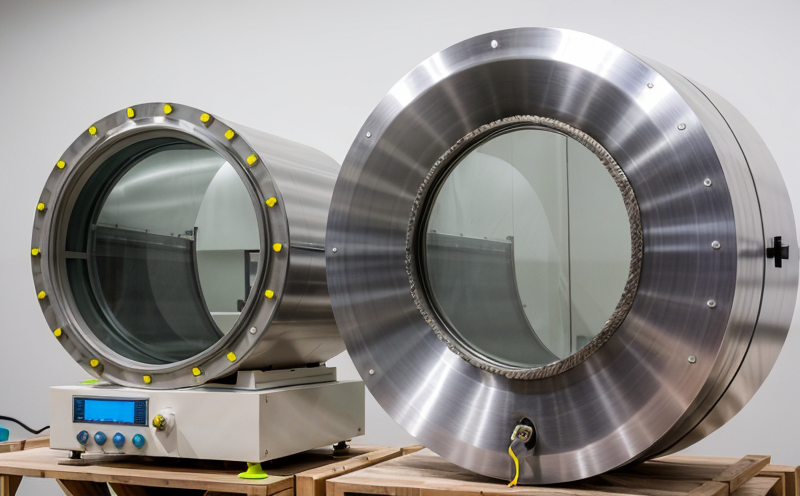ISO 22969 Boron-Based Shielding Material Testing
The ISO 22969 standard provides a comprehensive framework for ensuring that boron-based shielding materials used in various industries meet stringent quality and reliability standards. This service ensures compliance with international guidelines, offering peace of mind to manufacturers, regulatory bodies, and end users. The testing process involves rigorous evaluation of the material's performance under controlled conditions designed to simulate real-world scenarios.
The standard defines specific test methods aimed at assessing key properties such as neutron attenuation efficiency, thermal conductivity, mechanical strength, and chemical stability. Compliance with ISO 22969 is crucial for industries relying on boron-based materials for radiation shielding, including nuclear power plants, medical facilities, and space exploration.
The testing process begins with careful selection of the sample material to be tested. This includes ensuring that the specimen meets predefined dimensions and purity levels as specified in the standard. Once prepared, the samples undergo a series of tests designed to evaluate their performance under various conditions. These include:
- Neutron transmission measurements using gamma irradiation techniques.
- In-depth mechanical testing to assess structural integrity.
- Thermal conductivity analysis to ensure safe operation in high-temperature environments.
The results of these tests are meticulously recorded and analyzed, providing a comprehensive understanding of the material's performance. Compliance with ISO 22969 ensures that manufacturers can confidently use boron-based materials in applications where radiation shielding is critical, thereby enhancing safety and reliability.
Compliance with this standard is essential for companies operating within the nuclear industry or those involved in medical device manufacturing. By adhering to these stringent testing protocols, businesses can ensure their products meet international standards, fostering trust among customers and regulatory bodies.
Why Choose This Test
Selecting ISO 22969 boron-based shielding material testing is a strategic decision that benefits numerous stakeholders. For manufacturers, this test ensures their products meet international standards, enhancing marketability and compliance with regulatory requirements. Regulatory bodies can rely on these tests to verify the safety and efficacy of radiation shielding materials, ensuring public health and environmental protection.
For R&D engineers, this testing provides valuable insights into material performance under various conditions, enabling informed design decisions. Procurement teams benefit from knowing that they are sourcing materials that have been rigorously tested and certified according to international standards.
- Enhanced Safety: Ensures compliance with rigorous safety protocols, reducing the risk of radiation exposure.
- Increased Reliability: Provides confidence in material performance across diverse applications.
- Market Access: Facilitates entry into international markets by meeting regulatory requirements.
The comprehensive nature of ISO 22969 testing ensures that only the highest quality materials are approved for use, thereby reducing the likelihood of failures and associated risks. This commitment to excellence is crucial in industries where safety and reliability are paramount.
Quality and Reliability Assurance
The ISO 22969 testing process includes multiple stages designed to ensure the highest level of quality and reliability. The first step involves thorough sample preparation, ensuring that each specimen meets the required specifications in terms of size, shape, and purity. This meticulous approach is critical for obtaining accurate results.
- Sample Preparation: Ensures specimens meet ISO 22969 requirements regarding dimensions and purity.
- Neutron Transmission Testing: Evaluates the material's ability to attenuate neutrons, a critical property for radiation shielding.
- Mechanical Strength Assessment: Determines the structural integrity of the material under stress conditions.
The testing process is carried out using state-of-the-art equipment and techniques, ensuring that results are accurate and reliable. The use of advanced instrumentation allows for precise measurement and analysis, providing a comprehensive understanding of the material's performance.
Once the tests are completed, detailed reports are generated, summarizing all findings. These reports provide a clear picture of the material's performance, highlighting any areas where improvements could be made. This information is invaluable for manufacturers looking to optimize their processes and enhance product quality.
International Acceptance and Recognition
The ISO 22969 standard has gained widespread acceptance across various industries, including nuclear energy, medical technology, and aerospace. Its international recognition ensures that the results of this testing are widely accepted and respected.
- Nuclear Power Plants: Essential for ensuring safe operation and compliance with regulatory requirements.
- Medical Facilities: Vital for protecting patients and staff from harmful radiation exposure.
- Aerospace Industry: Critical for space missions where radiation protection is paramount.
The standard's rigorous testing protocols ensure that materials used in these industries meet the highest standards of quality and reliability. This international acceptance fosters trust among stakeholders and enhances market confidence.
Regulatory bodies around the world have adopted ISO 22969 as a benchmark for evaluating boron-based shielding materials, ensuring consistency and uniformity across different regions. Compliance with this standard is crucial for companies operating in these sectors, providing them with a competitive edge in an increasingly globalized market.





